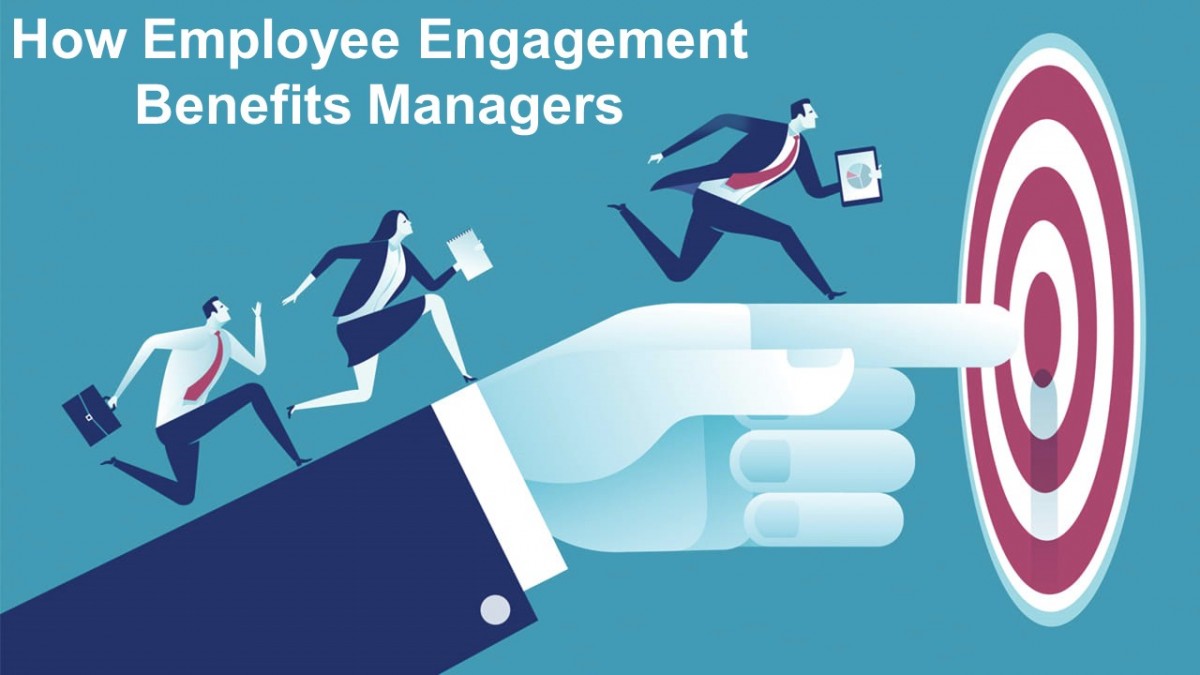Share:

We know that high levels of employee engagement are good for organizations for a variety of reasons, and we know that it also produces many benefits for employees.
Engaged employees have better overall job satisfaction, feel a strong sense of purpose in their work, feel more valued, are more dedicated to organizational success, and experience better professional and personal well-being.
But managers of fully engaged teams can experience many of these same benefits, plus some additional ones that are specific to the roles they play in the organization.
Employee engagement benefits managers by boosting performance, improving customer service, lowering turnover, and increasing profits. It can also create a positive work environment with fewer human resource issues, making a manager’s job easier and freeing up time to focus their attention on organizational excellence.
In this article, I’ll be discussing how making employee engagement a priority in their management approach can also benefit managers and make them better leaders.


Making Employee Engagement a Priority
There is a connection between employee engagement and retention rates, productivity, and profits, indicating that managers can account for around 70% of the disparities in employee engagement scores in U.S. businesses.
Research has shown that only 26% of managers think employee engagement is an essential part of their roles as managers. This may be why engagement levels are so low.
This means most managers don’t consider it when working on strategies and, by neglecting it, end up with less productive teams with team members who are not engaged or are actively disengaged.
This suggests that managers can significantly affect employee engagement. In order for organizations to continue to grow, innovate, and attract and retain top talent, managers should be constantly thinking of ways to improve engagement.
This is because employee engagement is dependent upon managers making engagement activities a habit, a process that they continuously work on. Though it may not be spelled out explicitly in their job descriptions, employee engagement should be a daily priority for all managers.
Top leadership can play an important role in helping managers be more aware of why they should prioritize employee engagement.
Just as recognition and feedback can boost an employee’s engagement with their job and make them better at doing it, top leadership can follow some of those same strategies to guide managers in being more proactive about engagement and more committed to making it a daily priority.
How Engagement Impacts the Organization and Benefits Managers
Engaged employees will be invested in the company because their work is meaningful and provides them with a sense of purpose.
This inspires loyalty to the organization, dedication to the vision, commitment to the team, and enthusiasm for the mission. These are qualities good managers are fortunate enough to have on their team when they are part of the engagement process.
Here are a few of the ways that employee engagement benefits organizations and how they provide some manager-specific benefits.
Performance
Better performance results from employee engagement. Engaged employees feel that their voices are heard and that their contributions are valued and instrumental in the organization’s success. Reports have indicated that employees who feel heard are 4.6 times more likely to feel empowered to perform their best work.
When engaged employees are able to connect the dots between their individual performance and the success of the company, which makes them more aware of how their performance directly impacts the organization, managers of engaged employees have teams that perform well, which leads to more productivity.
Most managers are always looking for ways to boost productivity. Some try to do so in ways that can hurt engagement, like implementing policies that make employees feel that they are not valued and are expendable.
But managers who truly care about their employees, and demonstrate that care, will have engaged employees who will not only be productive but also have an improvement mindset and continually look for ways that processes can be improved to increase productivity.


Customer Service
This benefit of employee engagement is directly tied to profitability and customer retention.
When employees are happier, customers will be happier. Engaging employees in their work increases their job satisfaction and overall happiness, which actually makes them better at serving clients.
Managers with teams of engaged employees in their departments deliver on customer service and have a good track record for retention, which is always beneficial to a manager.
Turnover
It is reported that turnover costs companies, on average, six to nine months of an employee’s salary to replace them. A high turnover rate can devastate a company’s revenue.
When employees are engaged with their work, they are likely to feel more loyalty to the organization and more likely to stay in the job. Highly engaged employees are 87% less likely to leave the organization they work for.
How can managers benefit?
On top of the high cost of turnover, the time and effort managers have to spend on dealing with attrition takes time away from the aspects of their role they should be focused on.
When retention is high, this allows managers to spend less time and effort on the recruitment process. If a manager is constantly having to deal with attrition, they aren’t able to focus enough time on current employees.
Profitability
Engaged employees, because they feel valued and that the work they do has a real impact on the success of the organization, are motivated to perform well and provide better customer service.
When performance improves, so does productivity and, therefore, profitability. In fact, profitability increases 21% when organizations have high levels of engagement.
Engaged employees are less likely to leave an organization, and the reduction in turnover can benefit the bottom line.
The boost in profitability that results from a high level of employee engagement shows management’s commitment to employees because it will have resulted from improvements in performance, productivity, and employees’ enthusiasm for their work.
Everyone Benefits
Managers generally have more contact with employees than top leadership, so engagement can really come down to the dynamics between managers and their direct reports.
Focusing on strengthening those relationships, building trust, and having open and frequent communication (beyond telling direct reports what to do) is not only the best way to improve employee engagement, it is also a good way for managers to learn how well they are managing their employees.
When employees are engaged, they are much more comfortable, and much more likely, to provide feedback to managers. They will also be better at receiving feedback from managers. This sort of feedback is invaluable because it can lead to process improvement and innovation.
By facilitating feedback between managers and employees, managers can gain insight into what they are doing right and what they could be doing better. Engagement and improvement then become a collaborative effort, with managers and employees working together to improve the work environment and make workers happier in their jobs.

Matt Tenney has been working to help organizations develop leaders who improve employee engagement and performance since 2012. He is the author of three leadership books, including the groundbreaking, highly acclaimed book Inspire Greatness: How to Motivate Employees with a Simple, Repeatable, Scalable Process.
Matt’s ideas have been featured in major media outlets and his clients include numerous national associations and Fortune 500 companies.
He is often invited to deliver keynote speeches at conferences and leadership meetings, and is known for delivering valuable, actionable insights in a way that is memorable and deeply inspiring.


